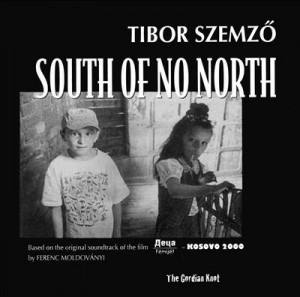| CD 2003 Leo Records CD LR 361 | ||
| 1. South Of No North 7’10” 2. Beuys 4’23” 3. 17 6’57” 4. Like Kaylash 5’23” 5. Edmond & Valdrim 4’21” 6. The Poppy One 6’47” 7. J.A.S. 5’17” 8. Gilt Edge 4’50” 9. Space 5’34” 10. On The Sly 4’42” Total duration: 55’28” MPEG video track for PC and MAC: |
||
| South Of No North – mp3 extract 1’55”
Music played by the Gordian Knot Company: Ernst Hirschberg – keyboards, samplers; Ildi Fodor – female voice, violin (9); Laca Kéringer – voice, violin (10); Mihály Huszár – acoustic and electric bass; Kinga Székely – prepared piano; Tibor Szemző – voice, 8mm-phone, flutes; Alois Samson – reeds, sax; Éva Posvanecz – viola, violin, voice; Péter Magyar Összekötő – drums, percussion Once, dropping into the Mirage sound studio, I was met with an unforgettable image: on the far side of the studio, in the acoustic aquarium beyond the glass wall, Szemző was just pressing a palm-sized pocket-radio to his ear, twisting its tuner: he searched about in the ethereal chaos with rapt attention. From time to time, chancing upon a suitable station, he desisted with this, and he slowly waved the device a few times before the microphone. Following the consummation of the appropriate movements, he once again pressed the sound source to his ear and continued his search. Music was just being made. The work, of course, was not exhausted with this operation; alongside played his earlier recorded “pure” musical measures, and the ambient, swirling overtones were placed onto this, portioned out painstakingly. This image offers an inside view, not only into the region of sources of Szemző’s compositions, but faithfully shows his artistic approach, as well, which reacts to the sounds and traditions of the environment, the “backdrop” in the broadest sense of the word. At the same time, he does not allow for contextual pressure; he does not submit himself to the requirements of the medium, the genre; he lives freely with them and creatively adapts them as the threads of his own hand-woven soundscapes. J. A. Tillmann |
||
